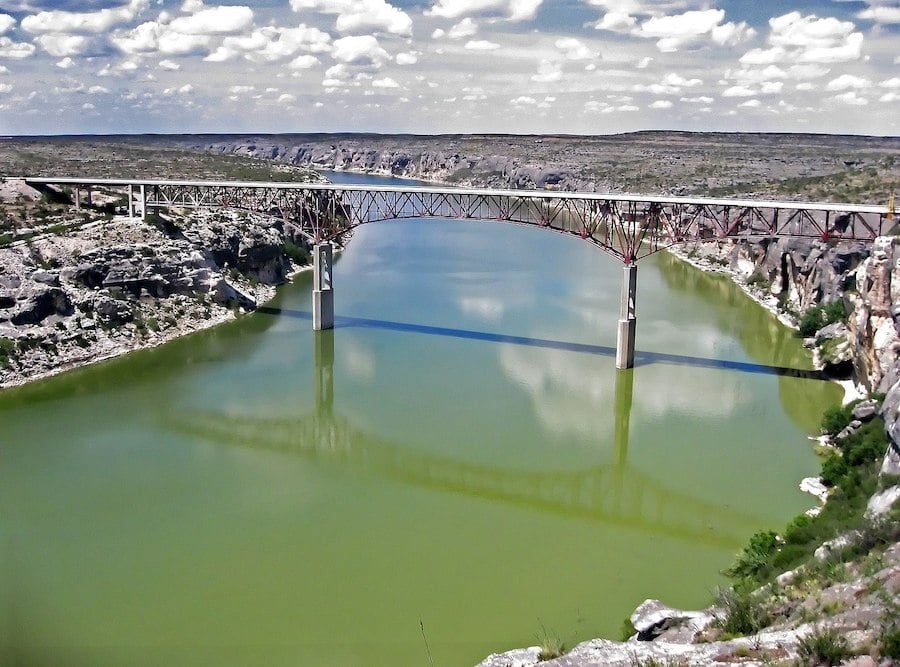WASHINGTON (CN) — Kicking off its new term, the Supreme Court heard arguments Monday over Texas and New Mexico’s agreement to share water from the Pecos River and whether the latter state is on the hook for water that evaporated before making it across state lines.
The decades-old case centers on a compact formed in the 1940s between New Mexico and Texas, where the river starts from and flows to, respectively. Under the deal, New Mexico agreed not to deplete the river’s flow and both states pledged to maintain it.
In 1974, Texas challenged the compact under original jurisdiction of the Supreme Court, where the case has been live on the docket ever since. Each year, a court-appointed river master publishes a report outlining New Mexico’s obligations, based on a formula for calculating the amount of water New Mexico must allow to flow across the border with Texas.
Hurricane Odile complicated the matter in 2014. After being downgraded to a tropical storm, it delivered downpours and flooding across the American Southwest. The Red Bluff Reservoir, which sits on the border between New Mexico and Texas, swelled to capacity after the storm.
Texas asked New Mexico to hold some of the Pecos River water belonging to the Lone Star State until the reservoir could handle it. New Mexico agreed, holding back about 51,000 acre-feet of water.
But by the following year, when Texas was ready to receive the water it was entitled to, a significant amount had evaporated. The appointed river master granted New Mexico delivery credits in 2018 to account for the amount of water that evaporated in 2015. Texas challenged the decision, arguing it should not be held responsible for the water loss and that the river master does not have the authority to retroactively amend past reports.
On Monday, Chief Justice John Roberts homed in on an argument by Texas Solicitor General Kyle Hawkins, who said the at-issue water could not be considered stored for Texas at the New Mexico’s Brantley Reservoir.
Roberts pointed out a Texas official specifically asked the water to be stored by New Mexico in an email, requesting the hold until the state could utilize it for rural farming and other needs. The email, the chief justice noted, was even titled as a “request for storage.”
“That email is simply reflecting a mutual mistake between the parties that these were unappropriated floodwaters and I think it’s crucial to note, Mr. Chief Justice, if that email…would have never been sent, nothing would have been different,” Hawkins said.
Roberts also asked Hawkins if New Mexico could simultaneously be storing the waters both at Texas’ request and for the controlling of floods. The solicitor general countered that storing the water for Texas’ use would have required a Warren Act contract, which the parties did not have in place.
“And number two, I think the fact that the United States released this water in August of 2015, when the public emergency expired and without any regard at all to whether any state could use the water, confirms that it was not being stored for future beneficial use,” Hawkins said.
Jeffrey Wechsler, a Montgomery & Andrews attorney who argued on behalf of New Mexico, said Texas should bear responsibility for evaporated waters stored at its request. He said that if not for Texas’ request, New Mexico would have released all water above its storage limit and let it flow across state lines into Texas.
The river master’s procedure for determining who was responsible for the evaporated water wasn’t questioned until three years after that decision, Wechsler noted.
Justice Brett Kavanaugh focused on real-world impacts for both parties, asking Wechsler how a decision against New Mexico would harm its residents.
The attorney said the dispute over a “significant amount of water in a very dry part of the country” is important, arguing a decision against his client might discourage cooperation between the two states, which the court has always urged.
“We think that ruling against New Mexico and in favor of Texas, would have the effect of elevating more of these issues to the court, because it would deprive the river master of the ability to resolve these issues as part of his duties under the amended decree,” Wechsler said.
Masha Hansford, a Justice Department attorney arguing on behalf of the federal government in defense of New Mexico, said Texas did not point to any error in the river master’s decision, which considered an email conversation as a formal request for water storage.
“The determination reaches a result that is both technically accurate and is highly fair,” Hansford said.
Subscribe to Closing Arguments
Sign up for new weekly newsletter Closing Arguments to get the latest about ongoing trials, major litigation and hot cases and rulings in courthouses around the U.S. and the world.









